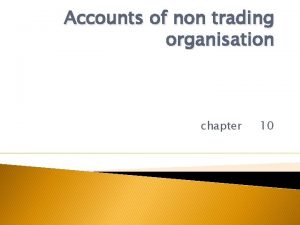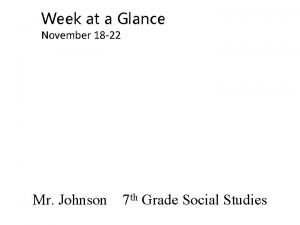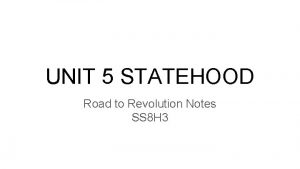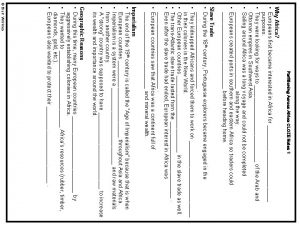Indias Independence CLOZE Notes 1 Trading In 1601




- Slides: 4

India’s Independence CLOZE Notes 1 Trading • In 1601, the British business, East India Trading Company, _______________ and began setting up trading posts. • _______________ trading with India in the 1660 s. • At first, the British were only interested in _______________ (ivory, gold, silks, dyes) and spices (cinnamon, saffron, pepper, sugar, vanilla). A Colony • By 1760, Great Britain had gained _______________ over India. • Great Britain official took control of the entire country when it declared _______________ of the British empire in 1765. Colonial Life • Great Britain _______________ over the colony and denied Indians any role in the government of their nation. • Indians were treated as _______________ in their own country. • There was inequality _______________. • Indians also faced discrimination and _______________ in British society. • The best jobs and schools _______________ to the British. • Indians were also _______________ by the British on goods that were found in their own country. Resentment • Indians began to resent being ruled by a foreign government and began to _______________. • Great Britain eventually _______________ , but they were small and not enough. • Indians were frustrated with the _______________ , and began to call for Indian independence. Nationalism • In the 1800 s, a feeling of _______________ in India. • Nationalism is a belief that people should be loyal to those with whom they share _______________. • The first two groups to work for the _______________ were the Indian National Congress in 1885 and the Muslim League in 1906. © Brain Wrinkles

India’s Independence CLOZE Notes 2 WWI’s Impact • During World War I, _______________ joined with the British army. • The British Parliament promised them that when the war ended, Indians would be able to have more _______________. Protests • Unfortunately, _______________ after the war and some Indian leaders argued for taking over the British government by force. • Many _______________ with the British false promises. • Those who _______________ and sent to jail for up to two years without a trial. Amritsar • In 1919, outside of the Temple of Amritsar, British soldiers _______________ a large group of Indians who they claimed were “gathering illegally”. • During this terrible tragedy, over _______________ and 1200 were injured. • It was this awful massacre that spurred Mohandas _______________ to fight for India’s independence. Gandhi • Mohandas Karamchand Gandhi was born in India on October 2 nd, 1869 and _______________. • After practicing law in South Africa _______________ , he returned to India in 1914 with a determination that people should be treated equally, no matter their race or religion. • He was shocked by the way Indians were _______________ by British authorities. • After the Amritsar massacre, Gandhi quit practicing law and decided to devote his life to _______________ of all Indians. • He was enraged at how the British _______________. • Gandhi believed it was time for the people of India to stop obeying the unjust British laws. Nonviolence • Gandhi did not think that _______________ was the right path for Indian independence. • Instead, he encouraged his followers to _______________ against the British in order to bring about social change. • Gandhi encouraged Indian followers to disobey unjust British laws in a _______________ , without using violence. © Brain Wrinkles

India’s Independence CLOZE Notes 3 Social Change • Gandhi developed what he called a “system of civil disobedience” and believed that it would make the world recognize the injustice in India and force change _______________. • He believed that acts of goodness _______________ while violence only produced negative ones. • Gandhi led his followers in economic boycotts, hunger strikes, and nonviolent protests to oppose the _______________. Salt March • In 1930, Gandhi led a _______________ to the ocean to oppose a British tax on salt. • Guards responded by _______________ the peaceful protestors. • News of this event _______________ and people around the world began to call for the British to grant Indian independence. Support • Even though Gandhi and his followers practiced non-violence, the British _______________. • The Indian protestors _______________ and long prison sentences. • Despite the dangers, _______________ Gandhi’s wisdom of nonviolent resistance and generated support for nationalism and independence. Independence • After fighting in WWII, Britain no longer had _______________ to keep India under its control. • Great Britain finally _______________ their colonial claims to India. • On _______________ , the Republic of India was established. • Today, many Indians credit India’s independence to the _______________. Split India • Even though India had won its independence, things were _______________ in the country. • Hindus and Muslims _______________ as to how to rule an independent India. • Eventually, the _______________ into India for the Hindus and Pakistan for the Muslims. © Brain Wrinkles

India’s Independence CLOZE Notes 4 Turmoil • The partition of India led to genocide; hundreds of thousands of people were killed in _______________. • Gandhi was very much disappointed by the partition because he wanted all Indians to _______________ in one country. • Even though he was Hindu, he felt that all religious groups _______________ in India. Gandhi • In 1948, at the age of 78, Mohandas _______________ on his way to a prayer meeting in New Delhi. • He was shot three times by a high-ranking Brahmin who _______________ for Muslims. © Brain Wrinkles







